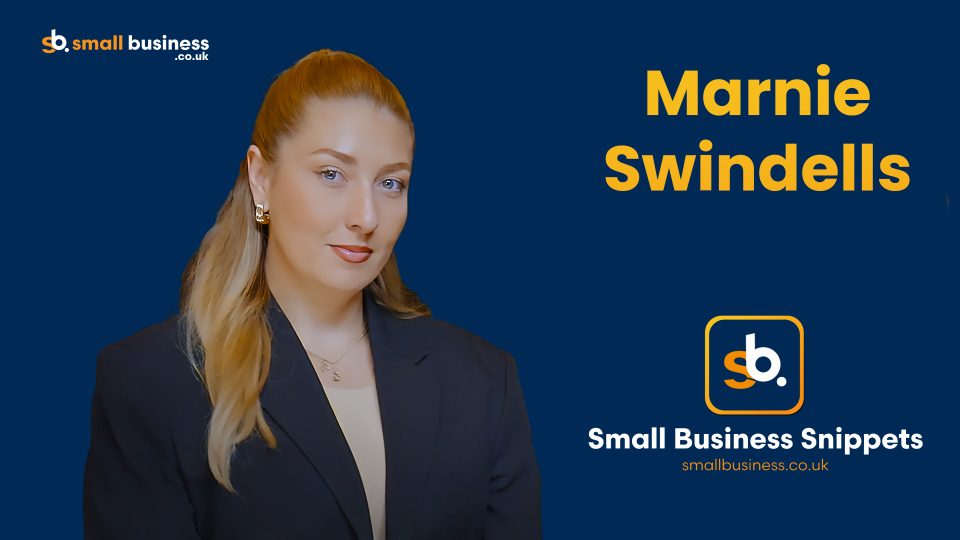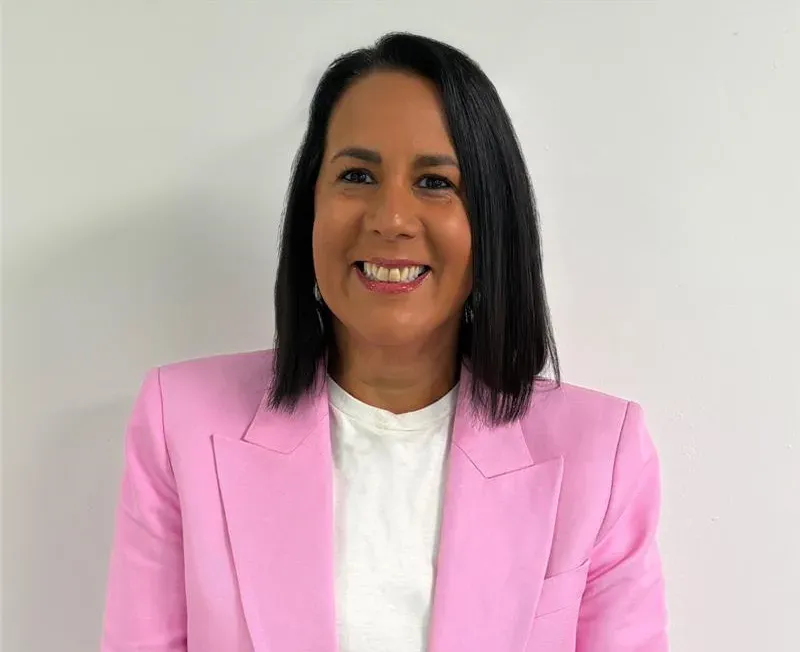Welcome to Small Business Snippets, the podcast from SmallBusiness.co.uk. Today’s guest is Marnie Swindells, owner of Bronx boxing gym and winner of The Apprentice 2023.
We’ll be talking about renovating a derelict building and how to write a business plan with no prior business experience.
Listen to the audio version of the interview below.
Alternatively, you can watch the full interview or read the interview transcript further down the page.
[embed]https://www.youtube.com/watch?v=lurXr6Cjm-w[/embed]
Filmed and edited by Bruno Mameli.
You can also catch our episodes with:
- Former Dragon and Yo! Sushi founder, Simon Woodroffe
- Mentors and authors, Bianca Miller-Cole and Byron Cole
- Rugby player and co-owner of Baffle Haus, George North
- Former Rugby Union player and founder of People’s Captain beer, Greg Bateman
- Scientist and The Gut Health Doctor, Megan Rossi, and commercial marketing expert, Jon Walsh – founders of Bio&Me
- Entrepreneur, author, investor and podcaster, Grace Beverley
- Entrepreneur and star of SAS: Who Dares Wins, Ollie Ollerton
- Business owner and former pro footballer, Thomas Hal Robson-Kanu
- Myleene Klass and Jamie Barber, founders of My Supper Hero
- Pub owner and winner of The Great British Bake Off, Candice Brown
- Entrepreneur and former athlete, Sally Gunnell
- Entrepreneur and The Apprentice winner, Sian Gabbidon
- Abel & Cole founder and chairman of Freddie’s Flowers, Keith Abel
- Entrepreneur and The Apprentice 2019 winner, Carina Lepore
- Dragon Tej Lalvani and entrepreneur Sam Jones
- Angel investor, entrepreneur and TV personality, Spencer Matthews
- Entrepreneur and former Dragon on Dragon’s Den Ireland, Lady Chanelle McCoy
- Businessman and The Apprentice winner, Mark Wright
- Entrepreneur and campaigner, Paul Lindley
- Managing director of Brompton Bikes, Will Butler-Adams
- Businessman and author, Gerald Ratner
- Entrepreneur and TV presenter, Trinny Woodall
- Pub owner and bartender on Channel 4’s First Dates, Merlin Griffiths
- Founder and chairman of Pimlico (formerly Pimlico Plumbers), Charlie Mullins
- Retail expert and former Dragon, Theo Paphitis
- Author and boardroom expert, John Tusa
- Digital guru and investor, Sherry Coutu
- Entrepreneur and former Dragon, Rachel Elnaugh
- Businesswoman and Dragon, Deborah Meaden
- Entrepreneur and The Apprentice 2005 candidate, Tim Campbell
- Gousto CEO, Timo Boldt
- Entrepreneur and The Apprentice 2018 candidate, Jackie Fast
- Investor and former Dragon, Piers Linney
- Investment fund manager, Nicola Horlick
- Supermodel turned entrepreneur, Caprice
To find out more about Small Business Snippets, you can download the trailer.
If you want to listen to the podcast elsewhere, it’s available on Apple Podcasts, Google Podcasts and Spotify. Watch the new video versions and subscribe over at our YouTube channel.
It’d also be great if you could leave us a review.
Remember to like us on Facebook @SmallBusinessExperts and follow us on Twitter @smallbusinessuk, all lower case.
Marnie Swindells podcast transcript
Hello everybody, and welcome back to the Small Business Snippets podcast, the podcast from SmallBusiness.co.uk. I’m your host, Anna Jordan. Today we have Marnie Swindells. You may recognise her as the winner of The Apprentice back in 2023.
She’s also the founder of boxing gym, Bronx, which as you can see, we are in right now.
In fact, we are in the ring as we speak. We’re not going head-to-head today. Instead, we’re going to be talking a bit about Marnie’s business and how it came to be.
Anna: Hello, Marnie.
Marnie: Hello, Anna. Thank you for having me.
Anna: Yeah, thank you for coming on.
How are you?
Marnie: I’m good. It has been a very, very busy week. But yeah, all part of the plan.
Anna: Lovely. Well, I am just going to go deep dive straight in today.
Marnie: Go for it!
This requires a bit the paper because I’m thinking about business owners or would-be entrepreneurs who have an idea that they sort of have a passion for but are in a job, maybe they’re unfulfilled by.
There’s a quote from you, which I’m going to read off just here that I really loved. “Put down the pen someone else gave you.
No one ever drafted a life worth living on borrowed ink.”
Anna: Okay. Paper be gone!
Marnie: Yeah, I absolutely love that saying. I think it’s so easy to get caught up in an easy, comfortable lifestyle in which we settle for whatever life gives us.
And I really believe nothing changes unless it changes. You have to really go out and happen to life and be the master of your own fate.
You can’t just follow a path that’s already set.
And I think a lot of people have dreams and passions that are so big, but they just feel so impossible. So, my advice to those people would be to not let life escape you, not let those passions go without a fight.
Look at it objectively. I think the best thing you can do is once you have that vision of an idea or a business, and once you can see it, it becomes tangible, then sort of reverse engineering. How do I get from where I am now in this corporate job or this job?
And how do I take the steps that I need to take in order to get me to there?
And there may be many steps. It may be a very arduous journey, but it will be worth it. And if it’s not worth it, at least you can die one day going, ‘I tried, I tried.’
That’s it. It honestly made me think about you pursuing a legal career.
Everything from the criminal defence lawyer that you met at your local boxing club.
Marnie: Yes.
Who helped you decide that you wanted to train as a barrister all the way through to deciding, ‘This isn’t my dream.’ And then returning to your love of boxing.
I would love to talk about your mindset, because the impression I’m getting is that there’s maybe a link between that phrase and maybe finding yourself in this legal career that you knew wasn’t quite for you.
Marnie: Yeah, I think one of the draws for that path for me was how impossible it was. I come from a very working class background. My dad worked on the railways. My mum was a cleaner.
And then after my father passed, it became a single parent, low-income household. We lived in a caravan.
So, the idea that I could be a barrister was so attractive and the challenge of it really turned me on. I really wanted it. I think there’s something about wanting something that’s so unattainable, which is what pulled me to it.
And that goes back to the initial question is you can’t be deterred from what is in the immediate vicinity.
You can’t look around you and think that this is your limitation.
Another quote that I absolutely love is,
“My shoes might be broken, but my mind is a palace.”
It’s the idea that anything is possible, and I really believe it is. Me pursuing that legal career. I had no business doing it. I did not belong there.
That is testament to what you can achieve if you really set your mind on something.
Anna: Yeah, absolutely. And it’s that tenacity that you’ve shown with everything that you do.
Marnie: Yeah. I usually get what I want, even if I go bankrupt, but I usually really try and pursue the things that I want because, just as I said, I don’t want to die one day knowing that I didn’t really give it a shot, you know?
And I think that’s within everybody. I don’t think I am special in that sense or blessed or gifted or even lucky.
I just think I have the kahunas to try.
One thing that I’ve noticed throughout Bronx’s messaging and its branding is very much a realness. I find that very refreshing.
And this space did not always look like this. When you first bought it was derelict. It had been unoccupied for eight years.
Asbestos, sewage. Not in great shape, to say the least.
Why did you go for this building over perhaps other buildings in the area?
Marnie: When I first walked in, I couldn’t even come fully into the site and view it because the sewage was knee high.
It was in a real mess.
But I looked at the size, I looked at the scope, I looked at the concrete ceilings, and I had the vision of what it could be, and I saw the potential, and I went home and I just could not leave it alone.
The thought of it just kept coming back day after day after day. And I thought, ‘I have to do something about it.’
I was 24 when I first viewed it, so there was no money in the bank account. I was just coming out of uni, my first sort of real job.
It really was a pipe dream at that point.
It was only when I approached the council and said, ‘Look, this is the big idea.’
I was always good at selling. I was always good at selling the vision.
So I said, ‘This is the big idea. This is what I can do. And if you have the faith in me, I will go away and raise the funds.
I will come back. I’ll put together a business plan. Can I make this happen?’
Given the state that the building was in and nobody else wanted it, the council were very quick for it to become someone else’s problem. The man who deals with the building on the council was kind and bold enough to look at me and share my vision of what it could be.
So, I went off.
I wrote a business plan that covered every possible question an investor could ask. Then I went and sought investment. I raised just short of £400,000 [from Sport England] for this downstairs part and started to put those wheels in motion. So, it is really about breaking down those steps.
I saw another quote that I really like is, “How do you eat an elephant?”
The premise is that you have to really break it down.
You can never eat it whole. You have to really take it step by step by step by step. And there may be many steps, but eventually it will come to fruition.
So again, my advice to anyone would be is to look at what something’s going to cost you, what you really want from it, what the mission is – really try and have those conversations with yourself.
And if you can do that, if you can break it down into all the pieces, create that business plan, create that vision, create that pathway. Then there’s really nothing off limits for anyone.
It’s impressive that you had a full business plan.
At Goldsmiths, you studied politics and history. Am I right?
Marnie: Yes, I did.
So, how did you learn how to create a business plan from there with no business background as such?
Marnie: Yeah, well, I didn’t. This is the thing, what’s crazy about how all this has transpired is in the beginning, it really was the blind leading the blind. I’ve learned everything on the job.
But I downloaded a template from Google and just chipped away at it each day.
I would think deeply about it to the point I was obsessed with the business plan. I’d be walking the dog and just chewing over different segments, and then I’d refine one segment and move on to the next. And it was just this evolution of ideas constantly, constantly.
I’ve always loved language. I’ve always loved people’s ability to articulate themselves.
I think if you can communicate an idea, whether that’s in written form or pitching, I think it’s the only way you can get what’s inside out.
I kept refining this business plan to make sure that it really reflected exactly what was within, exactly what I was trying to say and achieve.
Anna: Oh yeah, so much of it is in the story, who you are. And you have the most incredible backstory and where you got to where you are.
I felt the security of a salaried job. But I’ve also felt the lack of appreciation, the lack of passion in that.
Marnie Swindells
TweetMarnie: Yeah, it’s been a journey. It’s been a journey that’s been very, multifaceted, a lot of layers, a lot of in and out.
I was involved in the boxing world as a competitor for a long time, and then I was involved in it as a coach.
I dabbled in some promoting, then I left boxing entirely to join the legal world but found myself constantly being pulled back to the sport.
And now I found myself back in boxing, but in a more facilitating role. And I found that this is exactly where I was supposed to be. So, all of those meanders of my life and those different swaying in and out of different things, each taught me something else to add to the armour and bring me to the place I am today.
They always say, if you really love something, you find your way back to it.
Anna: Absolutely.
I’d love to move on to… Oh, I was talking a bit about finances within the business. And of course, I was actually planning to ask you, I’d seen a story about how thieves had broken in and stolen £3,000 worth of equipment.
Before that, you’d launched the second floor just for the gym.
To the viewers watching [and readers reading and listeners listening], there was another attempted break-in the weekend just gone [this episode was recorded the following Tuesday].
So, we’re right up to the minute here, but are there any lessons that you learned from the last time that you’ve carried forward to this time?
Marnie: Yeah, I think business is all about setbacks. It really is a roller coaster.
And not just the physicality of break-ins or even damage. Loss of coaches, loss of members, fluctuations. It’s full of surprises.
Some incredible ones, some awful ones.
One thing, again, I love about business is that every day is an opportunity. Any day the phone could ring and someone could say, ‘AJ wants to come and do a photoshoot in your gym’, or I’ve had it before [when] Sky Sports wants to hire it and do a public workout in your gym.
And then another day you can wake up and someone’s tried to break in, and you really have to literally roll with the punches. So, it’s part and parcel of it.
Business life is not for the faint-hearted. If you want an easy ride, stay in employment.
I can speak on it because I’ve felt both sides of the coin. I felt the security of a salaried job. But I’ve also felt the lack of appreciation, the lack of passion in that.
So as painful as business can be, and it can be heartbreaking at times, it also can be so rewarding and such a source of pride for me.
Entrepreneurs are so focused that sometimes other parts of their life can slip by the wayside.
And I know that you had issues with this when you were on The Apprentice, that perhaps your relationship suffered that, that you weren’t as happy with how other parts of your life were going because it was such an all-consuming process. How did you manage that?
Marnie: It was, it was.
And during that time, the process of being on the show was so consuming, so overwhelming, so novel. I was just an ordinary girl.
But I had this vision, went into the show and was spat out the other side with, at one point, the whole of the UK having an opinion on me. People saying negative things online.
The pressures of actually launching the business, the pressure to perform, to make sure Lord Sugar knows he made the right decision. The weight was enormous, far too much of a burden for one person to carry.
During that time, I leant on my partner, and it appears I leant on him too much.
That relationship suffered.
But I’m really, really, really grateful it did, because I look to it now and I look back on that time and I think I did it by myself. I got through it by myself. I launched the gym, I did all the PR, I did all the interviews. I remember the night of the launch, which was just around the breakdown of that relationship.
I was in my office and I’d go in, I would sit on the floor, I would sob for five minutes.
I would stand back up, wipe the tears, come back out, do an interview, go back in, sob. I must have done that five or six times throughout the night, a night that should have been so special, that I built up. The vision for so many years was that night.
And it absolutely collapsed under the weight of the breakdown of that relationship.
Fast forward about two years. And I could not be happier and prouder of myself.
I didn’t let that moment in time, as much as it could’ve, crack me. And it did crack me for a second, but I built back up from it. And now no one can ever take away what’s mine and what I’ve built.
So, I’m really happy how things worked out.
Anna: That’s incredible. It’s such an incredible mindset to have because I think that some people can get into this real pit of despair and riddled with regrets.
But you seem to just take everything on so well.
Marnie: I at the time I was in a pit of despair.
I was in the trenches. But I quickly realised the people that are meant to be on that journey with you will be.
And it was it was testament to people standing by you when you really, really, really need them. That was a time that I really, really, really needed my partner. I really, really needed my hand held.
And someone just in the background saying, ‘I’ve got you. It’s going to be okay.’
That was the time that he cracked.
And that meant that I had to absorb it myself. I did, and I’m here to tell the tale, so I don’t regret it.
Some lessons you need to go through, some journeys you have to take alone. I’m doing that.
And I’d also like that to be proof to people that whatever is going on, whatever circumstances you are facing, that truthfully learning to be alone and count on yourself, no one can take it away from you.
Then no one can say they had a hand in it, they had a part in it. So, if you do have a vision, figure out a way to do it yourself. Have people around you that are supportive, but never to the extent that if you lose that person, you’re lost.
Anna: Everything falls apart.
Marnie: Yeah, that was a big lesson for me.
I’m sure that every business owner has their version of the story that you just told. They’re going back and forth to have a cry, get back to it, have a cry, get back to it.
They’re watching going, ‘Yeah, same.’
Of course, having a strong support network, in terms of your friends and your family, is vital. What other tools helped you through that period of time?
Marnie: The joys, because there were also some real highs.
The things that went well were even sweeter because you knew what you’d been through to get there.
As much as people weren’t there when I needed them, when I was down, they also didn’t get to enjoy the highs. They didn’t get to see the success. They didn’t get to smell the roses with me.
And that in itself, I think, is enough. It consoles me enough to know that I get to enjoy it and it’s mine and I will look after it. I won’t abandon it. This is my baby forever.
But it’s hard because life throws curveballs at you all the time.
Just when you think things are going okay and everything’s steady, sometimes the most unimaginable, incomprehensible things come your way.
I think part of being a good business owner, a good leader, is being able to learn how to cope with that and deal with that.
If you do have a vision, figure out a way to do it yourself. Have people around you that are supportive, but never to the extent that if you lose that person, you’re lost.
Marnie Swindells
TweetI will also say one of the big lessons I learned during that time was the power of vulnerability. I’ve been brought up in a household where I was always taught not to cry. Don’t cry in front of anyone.
It’s a weakness.
There were moments where I found myself so, so broken that there was nothing holding me together. And had it not been for some of the people in my team and my friends and people that that worked for me that I genuinely now consider my family, truly my family. Had they not lifted me up and picked up the pieces, this gym would not be where it is today.
Equally, had I not let them in on that journey with me, had I been stoic and kept them afar, they might not have been able to reach out to me in the way they had.
You know, I feel like it’s so important in my position to be the captain of the ship and lead in. But if you sometimes don’t have the ability to steer, you could be taking the whole thing off course.
So, sometimes knowing when to step away, let your team take charge, take the lead and have your back.
That was a really, really, really important lesson.
Anna: I think especially there can be a mindset in entrepreneurship where it’s like, ‘Keep going no matter what.’ And with setbacks like that, it can run the risk of maybe not processing it.
And that it comes back to get you later in some way or another. It’s, again, it’s learning how to process that in a healthy way.
Marnie: My favourite things that I say a lot, my team will hear me say is, “Heavy is the head that wears the crown.”
But learning to share that burden and share that load has been pivotal for me, because I’ve found that people are good. People have their way in to catch me when I fall, if I just lean on them.
And as much as that crown is heavy, it’s also an absolute privilege. It’s a privilege to carry the responsibility of so many people’s lives, so many people’s work, so many people’s place that they come and find a sense of relief.
I find a lot of honour in that.
Going back to how you cope in those moments, I remind myself that, you know, I do have this job to do, and I do. I find strength knowing I have to live up to be the person that people think I am.
Anna: Yes, especially in the hard-nosed world of boxing. Legal as well.
That must be –
Marnie: That was what was quite refreshing about it is because, as you said, boxing is this hyper masculine, aggressive, show-no-weakness sport.
To find myself surrounded, not judged, was what was pivotal.
I think a lot of people, even in the corporate world, in any world, leaders showing that they have feelings too, that they have places where it hurts as well, I think can be a way that people can bond and resonate and see parts of themselves in you.
And if anything, it just creates more allegiance, more strength, more unity and more willingness to help.
You have a very transactional relationship with your team. That transaction goes both ways.
So, when you need them, when you really need to dip out for a second, you need someone to jump in.
I have that places that are very cold. It’s very superficial, very cut-throat. They lose the opportunity to create something special with the people they spend the most of their time with, you know, which is your colleagues.
Nice. Before we wrap up here today, I’d love to get your insight on starting a fitness business.
I think it’s an area which is becoming increasingly popular, and that a lot of would-be entrepreneurs are thinking about.
So, bringing us full circle, what kind of advice would you have for people tuning in about starting a fitness business in particular?
Marnie: Well, I would say – and I said this on The Apprentice – is that you aren’t selling fitness. You’re selling feelings. People’s main draw, I believe, to go to their gym, isn’t usually just about the fitness element.
People can get that from many places. You can get that from big chain commercial gyms that feel quite clinical.
You can get that from boutique gyms. If it was just about going to get a six-pack, you can do that anywhere for much cheaper. What people pay for is the experience and how it makes them feel.
The coaches are vital. Coaches are your bread and butter.
The atmosphere, the space, the brand. It’s how you make people feel. So, my advice would be to really look at it from a customer’s point of view. The customer’s eyes when they walk in, what are they met with?
I feel like the gyms are traditionally quite intimidating places, so the more inclusive, the more open door, the more friendly you can make it feel, the more successful I believe you’ll be.
Anna: Yeah, I would also say windows.
I’ve been in a few gyms before where it’s in a basement.
Marnie: We’re in the basement!
Anna: There’s so much light coming in! It makes such a difference.
Well, that’s a brilliant note to end on. Thank you so much for coming on the podcast, Marnie. It’s been great having you.
Marnie: Thank you.
Thank you so much for watching [or reading or listening], everybody.
If you want to find out more on becoming an entrepreneur and how to run your business, head over to SmallBusiness.co.uk and you can find our socials in the show notes.
See you next time.
Disclaimer: This story is auto-aggregated by a computer program and has not been created or edited by finopulse.
Publisher: Source link








